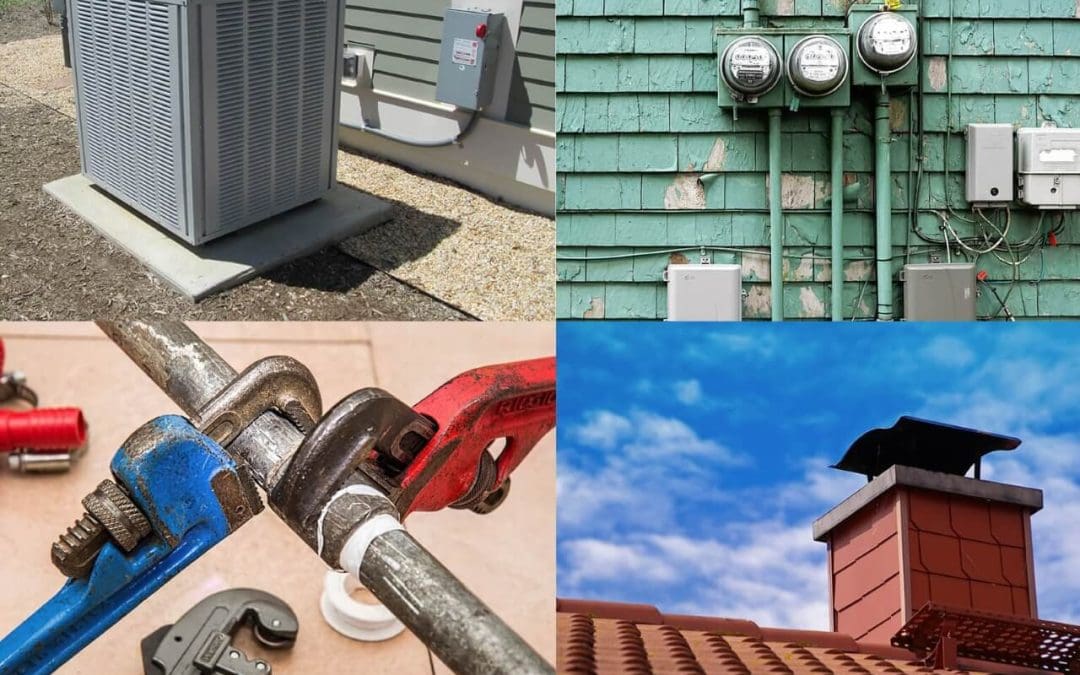If you’re buying an older home in Florida or renewing your homeowners insurance, you’ve probably heard the term “4-point inspection” mentioned. It might sound like another hurdle, but 4-point inspections help keep your home protected—and insured. Let’s break it down and walk through everything you need to know.
What Exactly is a 4-Point Inspection?
A four-point inspection is a focused look at four key systems in a home: the roof, electrical, plumbing, and HVAC (heating, ventilation, and air conditioning). Unlike a full home inspection, which covers just about everything from the foundation to the attic, this one sticks to those core areas. Insurance companies request it to assess the risk of insuring an older home, usually one that’s more than 20 years old.
They want to make sure these systems are in good working order and don’t pose a liability—like a roof that leaks or outdated wiring that could be a fire hazard. If everything checks out, you’re more likely to get coverage at a decent rate. If there are issues, you may need to make repairs before a policy is issued or renewed.
Why is it So Important in Florida?
Florida’s got a lot going on when it comes to home insurance. Between the age of many homes, the intense heat, salt air, and especially the hurricane risk, insurance companies take extra precautions. A 4-point inspection helps them get a quick snapshot of a home’s condition and decide whether they’re comfortable insuring it.
Also, over the past few years, the insurance market in Florida has gotten pretty tight. Some companies have pulled out entirely, and the ones that are left have become much stricter. So, if your home is older, this inspection is often non-negotiable.
What’s Covered in Each of the Four Points?
Each of the four systems is evaluated for age, condition, and whether it meets current safety standards.
The inspector will start by examining the roof’s age, type, and condition. If it’s nearing the end of its life or has visible damage, that can be a red flag for insurers. They’ll also want to know if it’s likely to withstand wind and rain, especially during hurricane season.
For the electrical system, the inspector checks the type of wiring, the condition of the panel, and whether the system has any hazards like double-tapped breakers or outdated components. Homes with aluminum wiring or Federal Pacific panels, for example, might raise red flags.
Next is plumbing. Inspectors look for leaks, water damage, and the type of piping. Old galvanized pipes or polybutylene are common in older homes and can be prone to failure, which insurance companies are wary of.
Finally, there’s the HVAC system. The inspector checks whether it heats and cools properly and whether it’s leaking or rusting. If it’s super old or not functioning, that could be an issue.
How Long Does It Take and What Should You Expect?
A 4-point inspection usually takes about 30 minutes to an hour, depending on the size of the home and its condition. It’s not as in-depth as a full home inspection, but it’s still a licensed inspector giving a professional assessment.
After the inspection, you’ll get a report—usually the same day or the next—that you can send to your insurance company. If everything’s in good shape, great. If not, the report will explain what needs attention. Sometimes it’s an easy fix. Other times, it might take a little more work.
Do You Still Need a Full Home Inspection?
If you’re buying a home, absolutely. The 4-point isn’t a replacement for a full inspection. It doesn’t cover structure, foundation, insulation, windows, doors, or appliances. It won’t catch mold, termites, or roof leaks unless they directly impact one of the four systems. The 4-point is mainly for insurance. The full inspection is for you—to understand what you’re buying and avoid surprises.
If you’re unsure whether you need a 4-point inspection or want to make sure your home is in good shape before insurance renewal time rolls around, it’s always smart to talk to a trusted inspector. In Florida’s tricky insurance market, staying ahead of the game makes a big difference.
FAQs About 4-Point Inspections
Is a 4-point inspection required by law in Florida?
No, it’s not a legal requirement. But many insurance companies require it before they’ll issue or renew a policy on a home that’s around 20 years or older.
Can I use my full home inspection instead of a 4-point inspection?
Sometimes, but not always. Most insurance companies want a specific 4-point form filled out. Some inspectors can provide both reports at the same time, so it’s worth asking.
What happens if my home “fails” the 4-point inspection?
Your house doesn’t pass or fail a 4-point inspection, but if there are issues, the insurance company may deny coverage until repairs are made. Once you fix the problem areas, a re-inspection can usually get you back on track.
Do newer homes need a 4-point inspection?
Generally, no. Homes less than 20 years old are usually exempt, but some insurance companies may still ask for it, especially if the home has had major work done or has been vacant for a while.
KeysInspector provides home inspections and 4-point inspections in southern Florida. Contact us to schedule our services.

